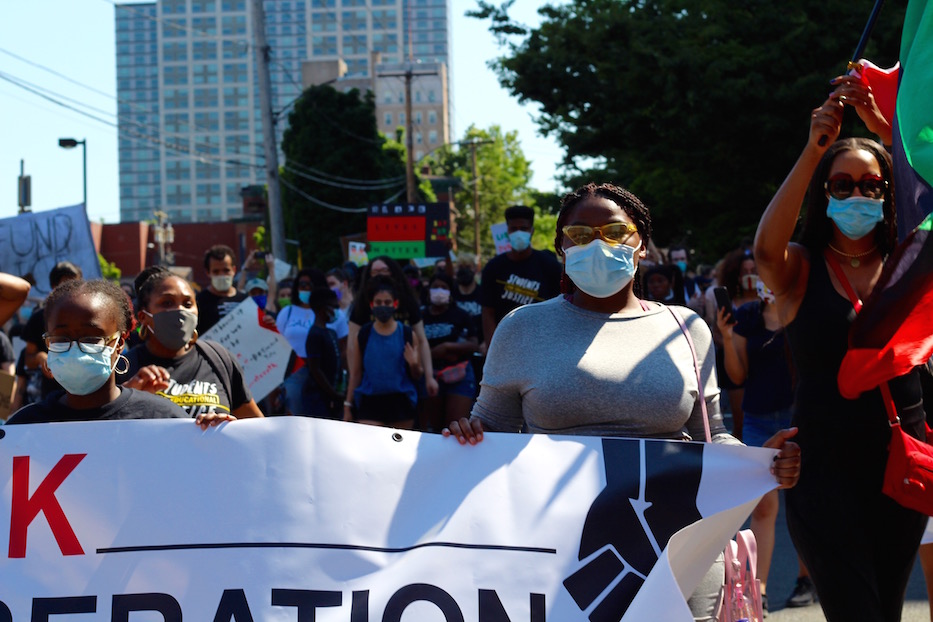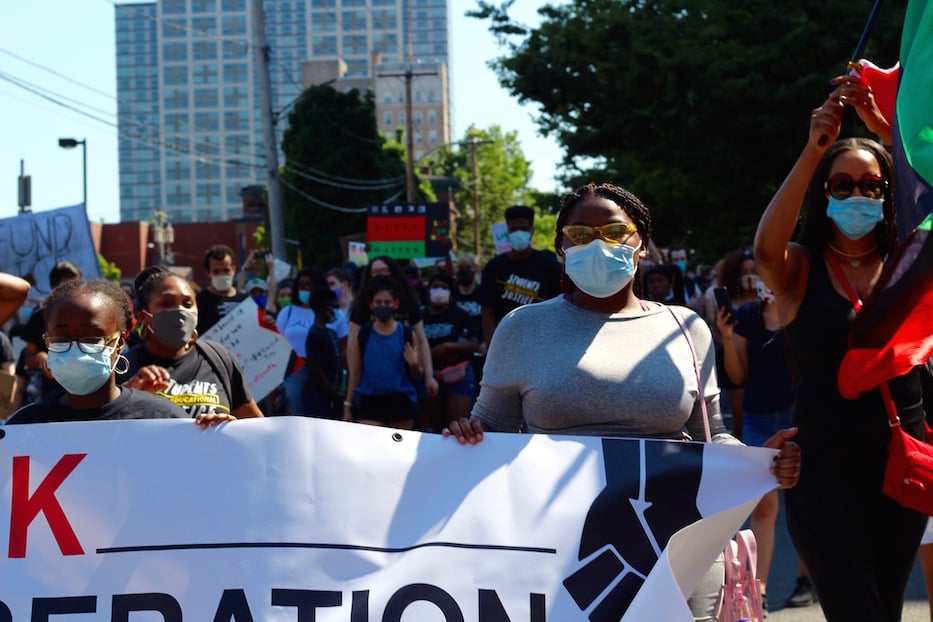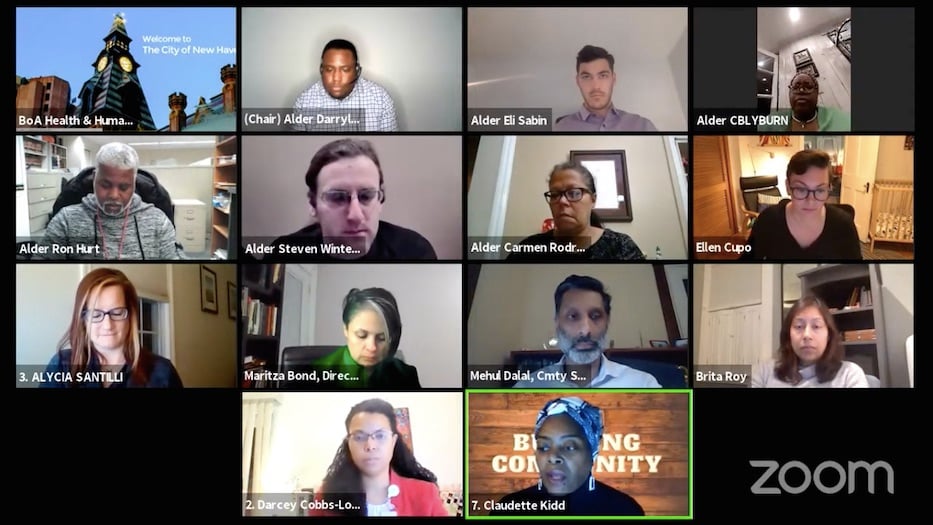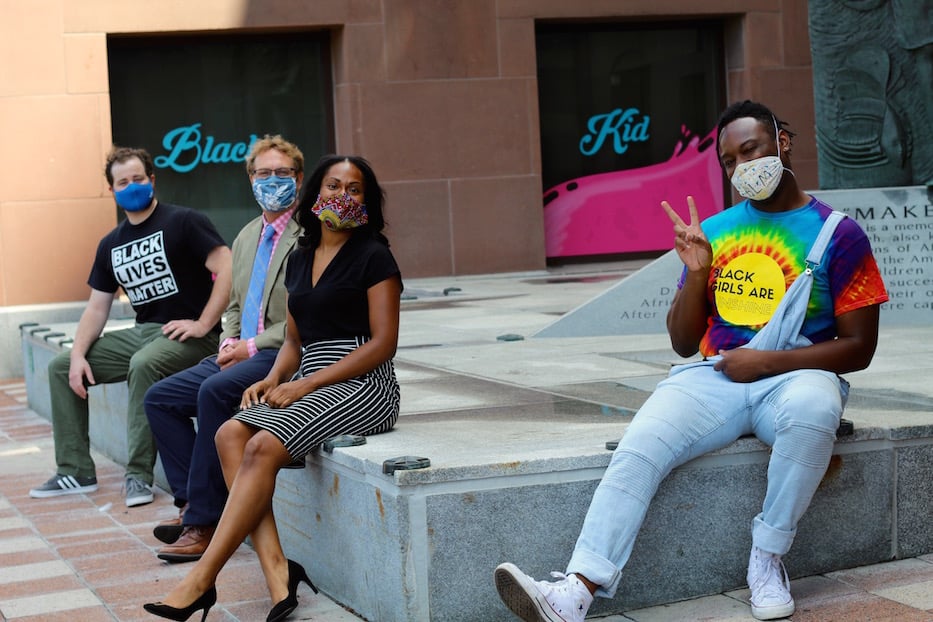
Arts & Culture | Public Health | Elicker Administration | COVID-19 | Arts & Anti-racism

Marchers at a rally and teach-in for Juneteenth last year. Lucy Gellman File Photo.
Hire a director of Diversity, Equity, and Inclusion. Reassess, rename, and revamp the city’s vision for an affirmative action plan. Get Covid-19 testing into the city’s public schools and prioritize vaccination outreach and education in Black and Latinx communities. Increase affordable housing and food security in the neighborhoods that need it most. Require an external review of police department practices.
Thursday night, those were just some of the recommendations to come before the Health and Human Services Committee of the New Haven Board of Alders, as they discussed next steps in recognizing racism as a public health crisis in the city. The conversation and public testimony follow a unanimous vote last July that resulted in the creation of a Racism As a Public Health Issue (RAPHI) working group. The recommendations will now go before the full Board of Alders. Read a full draft of them here.
“I realize this is such a passionate issue for many of us, and I certainly don’t want anyone’s voices to not be heard,” said Upper Westville Alder Darryl Brackeen, who spearheaded the resolution last year.
Members of the working group include Brackeen, Hill Alder Carmen Rodriguez, City Health Director Maritza Bond, City Community Services Administrator Mehul Dalal, New Haven Healthy Start Director Natasha Ray, Mt. Calvary Revival Center Pastor Daniel Bland, Community Alliance for Research and Engagement (CARE) Director Alycia Santilli, Yale School of Medicine Director of Population Health Brita Roy, and Darcey Cobbs-Lomax, director of community connections and social impact in the Yale New Haven Health System.
When the resolution passed last July, New Haven became one of over 60 cities, three states, and several countries to recognize racism as a public health crisis. As of this month, State Sen. Saud Anwar has also introduced a bill that would designate racism as a public health crisis on a statewide level. The bill also calls for a commission to study the impact of racism on public health.
Thursday, members of the public testified overwhelmingly in support of the recommendations, which range from housing justice to police accountability to food insecurity. Mothers and Others for Justice organizer Claudette Kidd began her testimony with the history of racism and medical apartheid in the U.S., from Samuel George Morton’s pseudoscientific practice of phrenology in the 1800s to the secretive beginnings of the Tuskegee Experiment in 1932.
In a steady, matter-of-fact voice, she chronicled a horrifying catalogue of events, including James Marion Sims’ experiments on enslaved Black women, for which he was lauded as the father of modern gynecology; the use of separate, under-resourced medical wards for Black soldiers during the American Civil War; the forced sterilization of Black women and non-Black women of color during the twentieth century; and documented existence of racial of bias among medical practitioners today. She pointed to the fact that Black people have received inequitable treatment and access to care during the Covid-19 pandemic.

"We all know what's going on with Covid right now, and with the history of what's been put upon people of color from colonial times, this is why some people in the community, they have such fear when it comes to things such as Covid and the vaccination, or even the flu and attending medical appointments,” she said. “We need to make changes, and we need to make it today, and we need to make it now. We need to let them know the value of health."
Witnesses To Hunger member Lisa McKnight pointed to elevated anxiety levels, food and housing insecurity, and lack of medical care that are more common among New Haveners of color. In 2018, a report from CARE and New Haven Food Policy Council found that 22 percent of the city’s residents were food insecure, meaning that they had limited or no access to food. That number hit 34 percent in the city’s six poorest neighborhoods, where residents were more likely to be Black or Latinx.
Last year, that number skyrocketed due to unemployment and underemployment during the Covid-19 pandemic. In June of last year, city emergency food service providers said that they have seen need grow four-fold since the start of the pandemic. As a Black woman who has experienced food insecurity firsthand, McKnight urged the committee to move forward with its recommendations, calling it “a must.”
“Our communities are often overburdened with healthcare issues or the lack of adequate healthcare,” she said. "Being on the receiving end of racism, I can equate it similar to addiction. My addiction is to survive mentally, physically, spiritually, financially, despite being judged by the color of my skin as to what I deserve in life."
A self-described “ambassador of love, peace and equality,” Remidy Shareef praised the recommendations, and called on the committee to push them through to the full Board of Alders. As director of outreach for the anti-violence group Ice The Beef and an organizer for New Haven Rising, he said that he sees racism in the epidemic of gun violence that has seized the city. He pointed to the mental, physical, and emotional toll of violence that members of Ice The Beef, some as young as elementary school, experience each day.
“Cities were not set up to give Black youth opportunities and hope,” he said. “New Haven is a clear example. It is a city that has suffered from decades of segregated development. The poorest neighborhoods in New Haven are neighborhoods that have more Black and Brown residents. These neighborhoods have higher asthma rates, higher Covid-19 infection rates, higher unemployment rates, and shorter life expectancy.”
While no one spoke in opposition, a few New Haveners pushed the working group to expand its recommendations. A fellow member of Witnesses To Hunger, Annie Harper noted the racial wealth gap among Black and Latinx people in New Haven, and urged the working group to "transform banking and debt practices,” and examine the city's support of reparations.
Writer, organizer and multimedia artist Katie Jones pressed the working group to move beyond its definition of law enforcement as “caretakers of in service to communities,” in an argument that veered toward police abolition rather than police reform.
“I’m highly in favor of this being recognized and getting to the root, and transforming all the way through,” she said.
How Arts Can Add To The Conversation

From left to right: New Haven Innovation Collaborative Director Michael Harris, Town Green Executive Director Win Davis, Cultural Affairs Director Adriane Jefferson and artist Isaac Bloodworth at an unveiling of Bloodworth's installation in August 2020. Lucy Gellman File Photo.
In a phone call Friday morning, Cultural Affairs Director Adriane Jefferson said that she considers the arts—and artists themselves—integral to the discussion of racism as a public health crisis. Since beginning her tenure last February, she has designed an anti-racism toolkit for arts organizations in the city, worked toward funding projects by and Covid-19 relief for artists of color, and led with a vision for cultural equity. In particular, she has prioritized public art projects that highlight Black joy.
She said that she sees the arts as part of a public health discussion because the field’s messengers—for racial equity, for food and climate justice, for affordable housing and beyond—are often Black, Indigenous, and People of Color (BIPOC) artists themselves. She pointed to the protests led by Black Lives Matter New Haven and Citywide Youth Coalition last summer, where poets, musicians, dancers, and visual artists often held the front lines.
“The arts have been really prevalent in movements,” she said. “Arts amplifies the movement, because of the way that it can connect to audiences and deliver the message. In addition to that, many of our artists are among those that are not receiving just and equitable services. The truth is, we can talk about arts equity all day, but what does that mean if you don't have a standard of equity in your livelihood as well?”
This month, the Department of Arts, Culture, and Tourism formally began work on a cultural equity plan with the New York-based firm Hester Street and New Haven's Civic Impact Lab. Jefferson has also been working closely with the Living Cities Network and the Connecticut Mental Health Center (CMHC), in trying to figure out how cultural and economic equity can contribute to community wellbeing and better mental health outcomes for Black and Latinx New Haveners.
“A lot of times, people think of the arts and they think it's just this fun, fluffy thing,” she said. “But the arts have a role to play in these conversations and in connecting sectors.”
As part of the city’s #TogetherNewHaven and Reopen New Haven campaigns, the Economic Development Administration has also partnered with Elm City Undoing Racism Organizing Collective (Elm City UROC) and the People’s Institute for Survival and Beyond (PISAB) to offer virtual undoing racism trainings to city staff.
Over multiple days, the trainings are designed to probe and untangle the roots of systemic racism, from Johann Friedrich Blumenbach’s racialized system of classification to the continued practice of settler-colonialism and economic enslavement through redlining, housing deeds, corporate land grabs, and allocation of federal support.
“Our team, with the entire city, is taking measures to end systemic racism [in our work],” said Economic Development Administrator Michael Piscitelli. “It is important to learn and go deep within our organization.”
In addition, the city is exploring membership to anti-racist organizations, including the Government Alliance on Race and Equity (GARE). The organization would provide anti-racism teaching and training tools to thousands of city employees.

